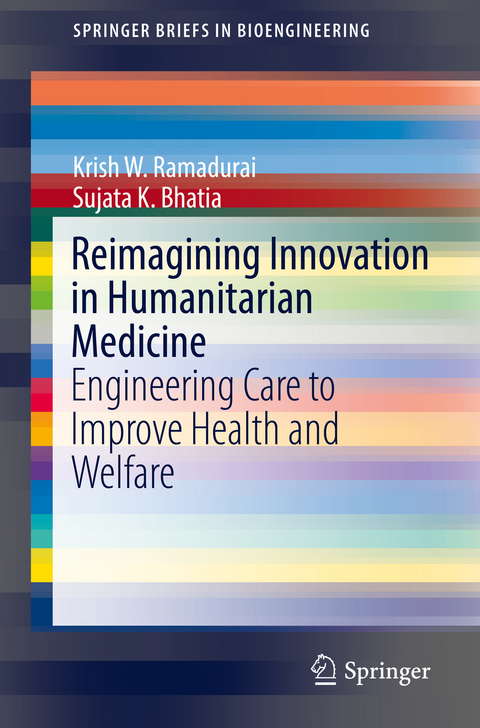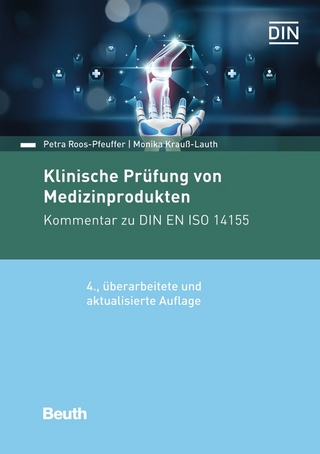
Reimagining Innovation in Humanitarian Medicine
Springer International Publishing (Verlag)
978-3-030-03284-5 (ISBN)
The development of highly versatile, feasible, and cost-effective medical devices and technologies that can be deployed in the field is essential to enhancing medical care in unconventional settings.
In this book we examine the nature of the creative problem-solving paradigm, and dissect the intersection of frugal, disruptive, open, and reverse innovation processes in advancing humanitarian medicine. Specifically, we examine the feasible deployment of these devices and technologies in unconventional environments not only by humanitarian aid and disaster relief agencies, but also by crisis-affected communities themselves. The challenge is complex, but the financial support and technical development of innovative solutions for the delivery of humanitarian aid is a process in which everyone is a stakeholder.
The Humanitarian Relief Paradigm.- Current Humanitarian Crises: Defining the Humanitarian Aid Complex.- Medical Treatment in Unconventional Settings: Meeting the Needs of Conflict Victims.- Health Is Wealth: Avoiding Chronic Illness as a Perpetuity.- The Humanitarian Paradox: What Happens When We Leave?.- Disparities of Healthcare Services in Conflict Areas.- Humanitarian Innovation and Frugal Engineering: A Social Perspective.- Humanitarian Innovation and Medicine: Defining the Innovation Process.- Adapting Innovation Sub-Types in Humanitarian Medicine: Turning the Unconventional into Conventional.- Frugal Innovation Sub-Types in Health and Medicine.- Contextualized Adaptations.- Bottom-Up.- Lean Tools and Techniques.- Opportunistic Solutions.- Disruptive Innovation: The Real Meaning.- Open and Reverse Innovation + Crowdsourcing and Wikicapital: The Future of Creative Problem-Solving.- Frugal Medical Technologies and Adaptive Solutions: Field-Based Applications.- Enhancing the Interventional Capacity of Humanitarian Practitioners, Community Health Workers, and Crisis-Stricken Communities.- Scaling Adaptive Solutions in the Humanitarian Field.- Surgical Care and Prosthetics.- Neonatal and Maternal Conditions.- Infectious Diseases.- Disruptive Technologies and Innovations in Aid and Disaster Relief: An Integrative Approach.- Data Collection and Crisis Management: Crowdsourced Crisis Mapping.- Robotics and Wearable Technology.- mHealth, Telehealth, and Blockchain.- Humanitarian Innovation in the Modern Era: Ending Human Suffering.- Reworking Knowledge Transfer in the Humanitarian Ecosystem: Empowering Conflict Victim and Refugee Innovation.- The Future of Humanitarian Medicine and Creative Problem-Solving.
"This book promotes the promise that introducing technological innovations into humanitarian crises can reduce the cost of care and improve health outcomes. ... this thin and thoughtful volume could be useful to students interested in learning more about the potential of innovative, disruptive technologies in humanitarian settings." (Dilshad Jaff, Medicine, Conflict and Survival, Vol. 35 (1), 2019)
| Erscheinungsdatum | 25.01.2019 |
|---|---|
| Reihe/Serie | SpringerBriefs in Bioengineering |
| Zusatzinfo | XII, 105 p. 53 illus., 51 illus. in color. |
| Verlagsort | Cham |
| Sprache | englisch |
| Maße | 155 x 235 mm |
| Gewicht | 195 g |
| Themenwelt | Medizin / Pharmazie ► Physiotherapie / Ergotherapie ► Orthopädie |
| Naturwissenschaften ► Biologie ► Genetik / Molekularbiologie | |
| Technik ► Umwelttechnik / Biotechnologie | |
| Schlagworte | Crisis medicine • development aid • Disaster medicine • Disaster Relief • Frugal Engineering in medicine • Frugal Medical Technologies • Health care in disaster response • Healthcare Services in Conflict Areas • humanitarian relief • Medical Needs of Conflict Victims • Medical Treatment in Unconventional Settings • the Humanitarian Aid Complex |
| ISBN-10 | 3-030-03284-1 / 3030032841 |
| ISBN-13 | 978-3-030-03284-5 / 9783030032845 |
| Zustand | Neuware |
| Informationen gemäß Produktsicherheitsverordnung (GPSR) | |
| Haben Sie eine Frage zum Produkt? |
aus dem Bereich


